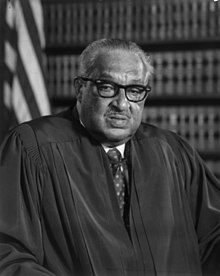Thurgood Marshall
| Thurgood Marshall | |
|---|---|
 |
|
| Associate Justice of the Supreme Court of the United States | |
|
In office October 2, 1967 – October 1, 1991 |
|
| Appointed by | Lyndon B. Johnson |
| Preceded by | Tom Clark |
| Succeeded by | Clarence Thomas |
| 32nd Solicitor General of the United States | |
|
In office August 23, 1965 – August 30, 1967 |
|
| President | Lyndon B. Johnson |
| Preceded by | Archibald Cox |
| Succeeded by | Erwin Griswold |
| Judge of the United States Court of Appeals for the Second Circuit | |
|
In office October 5, 1961 – August 23, 1965 |
|
| Appointed by | John F. Kennedy |
| Preceded by | Seat established |
| Succeeded by | Wilfred Feinberg |
| Personal details | |
| Born |
July 2, 1908 Baltimore, Maryland, U.S. |
| Died | January 24, 1993 (aged 84) Bethesda, Maryland, U.S. |
| Political party | Democratic |
| Spouse(s) | Buster Burey (1929–1955) Cecilia Suyat (1955–1993) |
| Children |
Thurgood John |
| Education |
Lincoln University, Pennsylvania (BA) Howard University (LLB) |
Thurgood Marshall (July 2, 1908 – January 24, 1993) was an Associate Justice of the Supreme Court of the United States, serving from October 1967 until October 1991. Marshall was the Court's 96th justice and its first African-American justice.
Before becoming a judge, Marshall was a lawyer who was best known for his high success rate in arguing before the Supreme Court and for the victory in Brown v. Board of Education, a 1954 decision that ruled that segregated public schools were unconstitutional. He served on the United States Court of Appeals for the Second Circuit after being appointed by President John F. Kennedy. He was appointed as the Solicitor General by President Lyndon Johnson in 1965. President Johnson nominated him to the United States Supreme Court in 1967 and he was approved by the Senate.
Marshall was born in Baltimore, Maryland, on July 2, 1908. One of his great-grandfathers was born in the modern-day Democratic Republic of the Congo, captured, and was taken to the United States as a slave; Marshall's paternal grandfather had also been enslaved. His original name was Thoroughgood, but he shortened it to Thurgood in second grade because he disliked spelling it. His father, William Marshall, worked as a railroad porter, and his mother Norma, as a teacher; they instilled in him an appreciation for the United States Constitution and the rule of law.
...
Wikipedia
